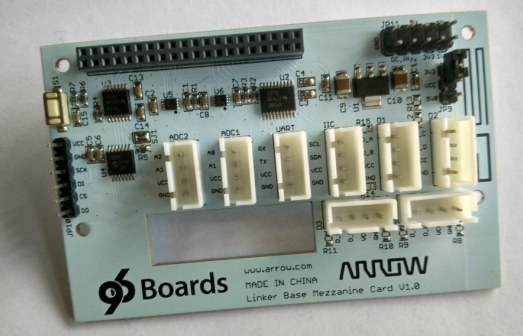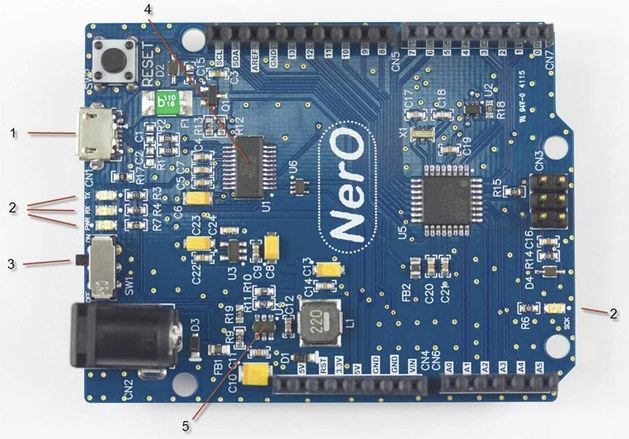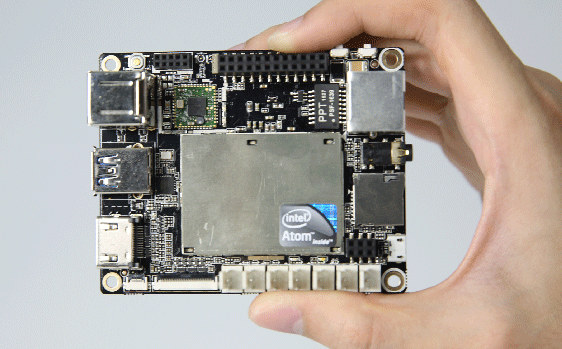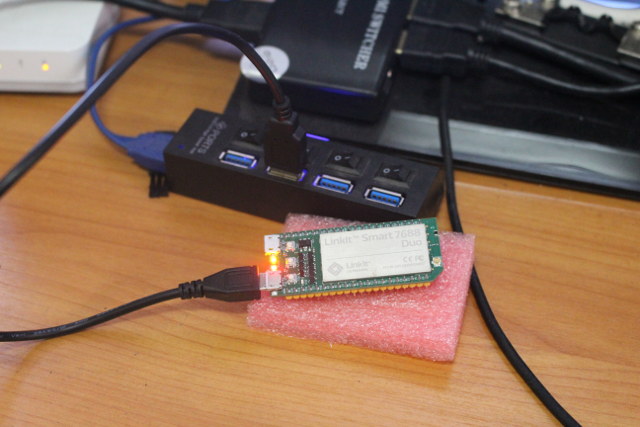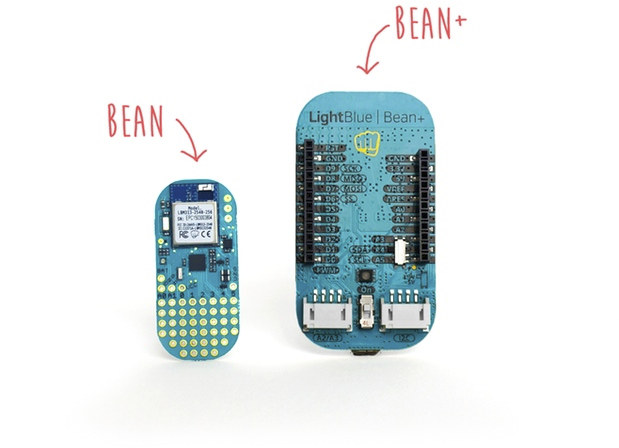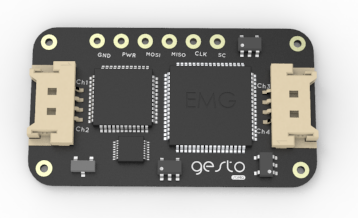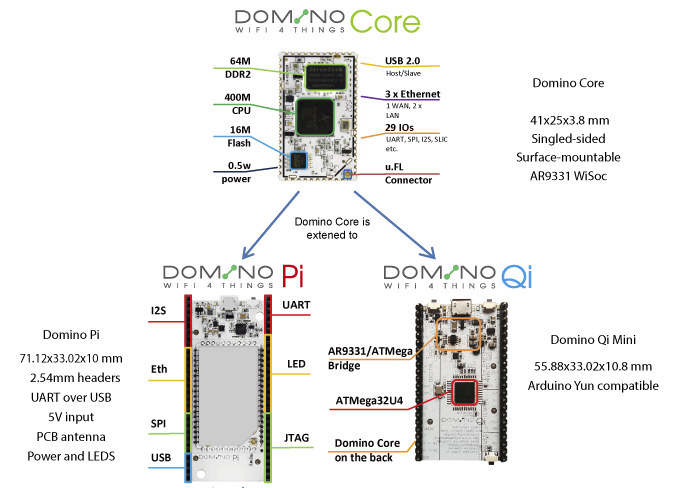Beside excellent software support, and a great community, the two most popular maker boards on the market, namely Arduino and Raspberry Pi, also have many add-on boards, respectively called Shields and Hats, to expand their user and connect sensors, buttons, displays, and so on… Several Linaro’s 96Boards compliant development board launched last year such as LeMaker Hikey and DragonBoard 410c with support for recent versions of Android and Debian, and recently three Mezzanine add-ons boards, as well as somewhat pricey USB to TLL debug board, have started to show up to make it an even more interesting platform. Linker mezzanine card starter kit for 96Boards The first kit is made by LinkSprite and includes Linker Base Mezzanine Card with several sensors and cables. Eight 4-pin connectors with ADC, UART, I2C, and GPIOs allow you connect the eight sensors ad modules provided with the kit:a button module, a red LED module, […]
FTDI NerO is an Energy Efficient Arduino UNO Compatible Board That Can Handle Higher Loads (Crowdfunding)
FTDI found out that the original Arduino UNO R3 boards had issues handling higher loads with 9V and 12V power input being limited to about 800mA and 300mA respectively before the voltage of the 5V regulator drops, so they decided to make their own supporting up to 1A. NerO board specifications: MCU – Atmel ATMega328 MCU @ 16MHz with Optiboot bootloader I/Os 14 Digital I/O Pins including 6 PWM outputs 6 Analog Inputs USB – micro USB port for programming using FTDI FT231XS USB UART interface (4) Misc – Status and PWR LEDs, on/off switch Power Supply – 7V to 20V ( 9V or 12V recommended ) via power barrel or VIN pin. 5V switching regulator. Dimensions – UNO R3 form factor FCC/CE certified The board is manufactured in Europe by MikroElektronika, a company which I started the hear about more and more, especially since they’ve launched their mikroBUS standard […]
LattePanda is a $79 Arduino Compatible Intel Atom x5 Board Running Windows 10 (Crowdfunding)
I feel like I’m living in another world after writing a title combining Arduino, Intel and Windows 10, but that’s exactly what LattePanda is promising with a development board featuring both an Intel Atom x5-Z8300 processor and an Atmel AVR MCU, and Windows 10 as the operating system. LattePanda board specifications: SoC – Intel Atom x5-Z8300 “Cherry Trail” quad core processor @ 1.44 GHz (Burst frequency: 1.84 GHz) with Intel Gen8 HD graphics @ 500 MHz System Memory – 2 to 4 GB DDR3L Storage – 32 or 64 GB eMMC, micro SD slot MCU – Atmel Atmega32u4 micro-controller Video Output / Display – HDMI, and MIPID DSI connector Audio I/O – HDMI, 3.5mm audio port Connectivity – Ethernet, WiFi and Bluetooth 4.0 USB – 1x USB 3.0 port, 2x USB 2.0 host ports, 1x micro USB port for power Serial – 1x from Intel SoC, 1x from Atmel MCU […]
Quick Start Guide for LinkIt Smart 7688 (Duo) Board
Mediatek Labs has announced LinkIt Smart 7688 development boards powered by Mediatek MT7688 WiSoC earlier today, but I was selected for a close beta several weeks before the launch, and I’ve had time to play a little with the boards, so today I’ll report my experience getting started with LinkIt Smart 7688 amd 7688 Duo by writing a Quick Start Guide showing how to setup the boards, upgrade firmware, access the serial console, run “Blink LED” sample applications with Python and JavaScript, as well as the Arduino IDE, and connect to the Internet. Initial Setup You’ll only need a micro USB cable and a computer with WiFi and USB ports to get started with the board. The green LED (top) for the MCU will turn on immediately, while the red LED (bottom) for WiFI will blink once, and only turn on continuously after 5 seconds, and within 30 seconds after […]
Mediatek LinkIt Smart 7688 and Smart 7688 DUO Boards Run OpenWRT for IoT Applications
MediaTek LinkIt is a collection of development platforms designed for the prototyping of wearables and Internet of Things (IoT) devices, and last year they started with LinkIt ONE board based on Mediatek MT2501 “Aster” micro-controller and featuring WiFi, Bluetooth, GPSD and GSM/GPRS connectivity. Mediatek Labs has now launched two new LinkIt board, namely LinkIt Smart 7688 and LinkIt Smart 7688 DUO, both powered by Mediatek MT7688 MIPS processor and running OpenWRT, with the latter also adding an Atmel ATmega32U4 for Arduino compatibility. LinkIt Smart 7688 Board LinkIt Smart 7688 is then the simpler of the two with the following specifications: Processor – Mediatek MT7688AN MIPS24KEc processor @ 580 MHz with WiFi System Memory – 128MB DDR2 RAM. Storage – 32MB flash + micro SD slot Connectivity – 1T1R Wi-Fi 802.11 b/g/n with chip antenna and I-PEX conector USB – 1x micro USB host port, 1x micro USB port for power […]
LightBlue Bean+ Bluetooth LE Board is Programmed Wirelessly, Lasts One Year on a Charge (Crowdfunding)
Punch Through launched a crowdfunding campaign back in 2013 for LightBlue Cortado an innovative Arduino compatible BLE board that can only be programmed wirelessly over Bluetooth Smart. The board has since then been renamed to LightBlue Bean, and the company allegedly delivered rewards to backers on time, a rarity in the crowdfunding world. LightBlue Bean+, the second version of the board, is larger with solderless headers, supports more Bluetooth LE capabilities such as MIDI, and includes a battery. The project launched on Kickstarter yesterday, and already raised over $40,000, surpassing the $30,000 funding target set by the team. LightBlue Bean+ board specifications: MCU – Info N/A (Bean has an Atmel ATmega328P @ 8MHz with 32KB Flash, 1KB EEPROM, 2KB SRAM) Bluetooth Bluetooth LE with support for 5 new capabilities: beacon, MIDI, HID, ANCS and observer role. Hardware module undisclosed (Bean has an LBM313 Module with Texas Instruments CC2540) Up to 400 […]
Gesto is a Wearable Gesture Motion Solution for Makers (Crowdfunding)
A while ago I wrote about an open source prosthetic arm controlled by signals generated by your arm’s muscles. It used an Arduino board, a bio-feedback shield by Olimex, and inMoov Hand for the arm and hand. It worked, but lacked accuracy. Gesto is a solution based on boards powered by Atmel MCUs that looks somewhat similar, but with higher accuracy (over 100 gestures have been tested), and the project has now been launched on Crowdsupply. Two kits are available: Gesto Stella EMG circuit – ADS1294 MCU – Atmel ATmega1284p 2x EMG cables connector Through holes with GND, PWR, MOSI, MISO, CLK and SC Dimensions – 35 x 20 mm Includes 16 disposable electrodes and relevant cables Gesto Caelum EMG circuit – ADS1294 MCU – Atmel ATmega1284p Sensors – 3-axis accelerometer (MMA8652FC) Connectivity – Bluetooth (RN42-HID) 2x EMG cables connector USB – Micro USB connector Programming – ICSP connector Power […]
Domino Core Wi-Fi Module Powers an Arduino Yun Compatible Board (Crowdfunding)
The makers of GL.iNet OpenWRT compatible router have decided to build a module and two development boards based on Qualcomm Atheros AR9331 WiSoC. Domino.IO is composed of a Domino Core Wi-Fi module that can be used in your own project, but if also part of Domino Pi, a breadboard-friendly board featuring the module, and Domino Qi mini, a similar board with an Atmel ATMEga32U MCU making it compatible with Arduino Yun board. Domino Core specifications: SoC – Qualcomm Atheros AR9331 MIPS processor @ 400MHz with System Memory – 64MB DDR3 Storage – 16MB flash Connectivity – 802.11 b/g/n Wi-Fi with u.FL connector I/Os via half through holes – USB 2.0 host/slave, 3x Ethernet, 29 IOs including UART, SPI, I2S, SLIC, etc… Dimensions – 41 x 25 x 3.8 mm Domino Pi and Qi mini summarized specifications are shown in the table below. Domino Pi Domino Qi Mini Wi-Fi Module Domino […]


